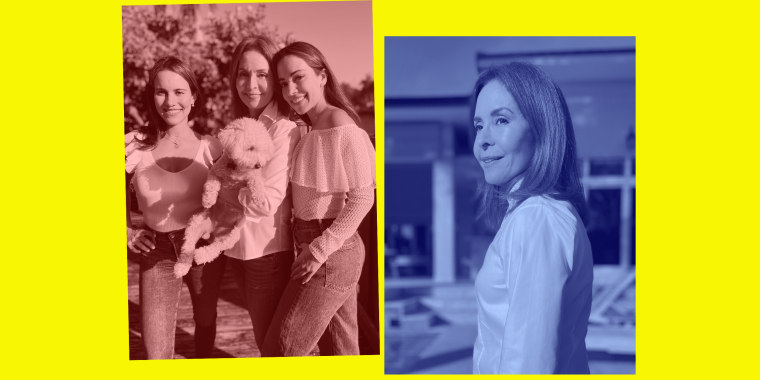
Mariana Atencio’s mother was among the last people to leave Venezuela before the pandemic caused the government to shut down the airports.Courtesy Mariana Atencio
Global pandemic. Those two words set my whole family in a frenzy. As the world’s borders shut down, my biggest fear wasn’t for my own health: it was for the life of my 66-year-old mami, living alone in Venezuela, our home country of 26 million people, where unofficial estimates indicate the number of intensive care beds is less than 100.
And while being worried for the health of an elderly relative is perhaps one of the most common feelings at the moment, the trauma of losing my papi to the seasonal flu in Venezuela just two years ago intensified that worry into a panic.
When he got ill there in 2018, there were power outages in some of the country’s intensive care units, doctors were telling me how to get basic medicines on the black market and many hospitals just didn’t have gloves, masks or even running water. We lost my dad in just 3 weeks — and all of that was before the novel coronavirus.
“I won’t let this happen again,” I said to myself this March. My siblings and I had to get Mami out of Venezuela.
The country has been on the brink for a while.
The International Monetary Fund estimated that Venezuela’s inflation rate would hit 10 million percent by the end of last year. Since the drop in oil prices — the country’s main source of revenue — began in February of this year, the crisis has spun out of control, its effects getting worse by the day. Lines for gas are now so long that some doctors have to ride their bikes to get to the emergency room. In a video circulating on twitter, a doctor pleaded with the military to help them get gas. “We’ve been in line for up to two days,” he says. “We’re the soldiers now.”
Little is known about the actual spread of the coronavirus in Venezuela; the government claims there are only 357 cases nationwide as of May 5, though the United Nations describes it as one of the countries most vulnerable to the disease due to the lack of sanitation and its collapsed health care system. Critics question those figures — especially since, according to the opposition leader and National Assembly President Juan Guaidó, the country only performs 100 COVID-19 tests per day. (Neighboring Colombia is doing 17,000 tests a day.)
What’s worse, the ongoing humanitarian crisis is compounded by a shamelessly corrupt new revolutionary elite that didn’t think the virus had anything to do with them.
In an Instagram post from March 21, Jesus Amoroso — the son of dictator Nicolas Maduro’s top anti-corruption official — posed in front of a luxury SUV while giving the finger. The caption read: “If I have it… If I don’t… suck it, gossipers.” He then posted a video rapping: “I’m enjoying it ‘cause I can.” In 2017, his father Elvis Amoroso was sanctioned by the U.S. Department of the Treasury for alleged corruption and undermining democracy.
Amoroso Jr.’s post was a response to news reports which revealed he hosted an island party on the white sand beaches of Los Roques, an archipelago off the coast of Venezuela (where George H.W. Bush once famously fished) on the same week when I was trying to get my mom out. By then, news of the pandemic and what it could do to the country’s depleted health system were widely known. People watched online as the offspring of Venezuela’s rulers cheered bikini-clad women — with cigarettes, luxury handbags and cellphones in hand — twerking on the beach to house music.


